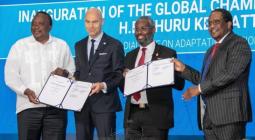Kenya launches climate change calculator in first for East Africa

Kenya has a new bespoke energy and emissions model to help it achieve climate change goals in the newly launched Kenya Carbon Emission Reduction Tool.
The interactive energy model, the first in East Africa, was delivered under the UK Government’s international 2050 Calculator programme, which is funded by the UK’s International Climate Finance. It was led by engineering, management and development consultancy Mott MacDonald, and a consortium which includes Imperial College London, Climate and energy and climate change consultancy Ricardo.
The Kenya Carbon Emission Reduction Tool (KCERT 2050) will allow users to try out options for reducing climate change-inducing carbon emissions at a faster rate. This will allow them to build a country pathway to meet long-term emission targets to 2050 and beyond. It can be used to support policy-making to allow governments to increase their national action on climate change and strengthen their ambitions in line with the Paris Agreement.
The KCERT 2050 will also be accessible to Kenyan energy producers and consumers, including members of the public, to understand the energy and emissions-related choices they make. It will provide a platform to engage around the challenges and opportunities in the future energy system and responses to climate change.
Simplifying climate change strategies for all
Speaking at the launch of the calculator British High Commissioner to Kenya Jane Marriott welcome the launch of the KCERT 2050 as a way to strengthen the UK-Kenya Strategic Partnership on climate action. “This tool, which is a first in East Africa, will support government departments in Kenya to design and deliver evidence-based, inclusive policies on emissions reductions, energy access and matching energy supply and demand.
“I look forward to Kenya acting as a pioneer in championing the use of this innovative tool that will provide options for implementing Kenya’s emission reduction strategies and achieving net-zero development pathways by 2050,” said Marriott.
Head of Data Science and Analytics at Strathmore University and lead KCERT modeller Dr John Olukuru said the data-driven policy-making tool will help all Kenyans engage in a well-informed climate change debate.
“The calculator considers all sectors, stakeholders’ input and various scenarios that provide enormous volumes of data and hence sets as foundation to applying AI and machine learning to monitor and decrease carbon emissions, streamline operations to empower every policymaker to recognise that climate action provides an opportunity to create value by tapping into new markets and meeting growing demand for low-carbon plus green services,” said Olukuru.
Dr Onesmus Mwabonje, Imperial College London’s Centre for Environmental Policy and core member of the Consortium team for Kenya, said the calculator will also help to break down silos and generate the consensus needed across government departments to effectively combat, mitigate and adapt to cline change. “The decision support capacity that the International 2050 Calculator programme has developed on the modelling of complex transitions and technological options will have a lasting impact in the country and beyond.”
The KCERT 2050 is available online.
Theresa Smith | https://www.esi-africa.com/




